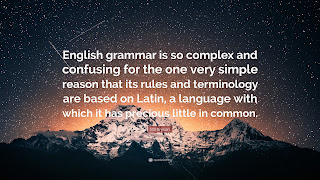The Devil's Advocate - Grammar
As writers, I think most of us would argue the need for good grammar in all writing and primary school teachers strive to cover the vast catalogue of rules, definitions, and, oh yes, the exceptions to the rules! Eminent professors of linguistics vehemently support this teaching in schools: Both Willem Hollman, at Lancaster University, and Dick Hudson, at UCL have realms of research that prove how teaching English grammar benefits the learning of foreign languages because it helps us understand how our language works. (https://www.tes.com/magazine/teaching-learning/primary/there-really-too-grammar-teaching-schools)
But here’s the thing: Yesterday I observed a lesson about superlatives and comparatives. We gazed at the PowerPoint, stared at the litany of suffixes and root words, and strove to understand the various spellings and correlations. As the slides flicked by, some of us diligently took notes, others of us stared out of the window, and one or two of us picked noses or flicked tiny rolled-up bits of paper at each other. OK, I am the eldest by a number of decades but I couldn’t help empathising with these ten-year-olds; goggle-eyed and bored to tears.
I must add that this is no reflection on the teacher – the primary curriculum is so jam-packed full of objectives and curriculum expectations that most lessons are taught under huge pressures and limited time but sometimes I watch a lesson and think – what is the point?
I mean, why on earth does it matter whether we know the definitions and theory of superlative and comparative, the teaching behind it, or even the difference in spellings (hello – we have spell checkers now!) The fact is every child in that class uses superlatives and comparatives in their writing without even realising they are superlatives and comparatives. An even bigger fact, most adults do not understand this terminology (Superlative and Comparative? Isn’t that a new sports brand?) and life seems to go on quite happily for them.
Now, the writers among us will probably be apoplectic with some of the opinions above (actually I found some parts, especially the bit about the spell checker very difficult to write) because writing books goes hand in hand with good grammar – yet I am going to dare to ask the question – IS this really true? (Ahem, remember I am playing the devil’s advocate.) How many popular books loved and cherished by children and adults the world over are grammatically incorrect or, what we refer to in the profession, badly written? Yet, these stories and informative tomes bring so much pleasure and escapism.
Adam Caller, founder, and CEO of Tutors International commented on the findings of a research study that showed teaching grammar failed to improve narrative writing in six to seven-year-olds. He said, “I have misgivings about the current emphasis on the methodical teaching of grammar in schools. There is a difference between the way language is written and how it is spoken. Language is not a fixed entity and so writing can’t be improved by following fixed rules and regulations which will become obsolete in time. Language is fluid, constantly changing on a daily basis and so it creates itself.” (https://www.prnewswire.co.uk/news-releases/leading-educationalist-expresses-his-opinion-on-the-teaching-of-grammar-in-schools-818443917.html)
Well, perhaps he has a point about the methodical teaching particularly as personally, I do have an allergy to PowerPoint but what is your opinion? How important is grammar to you? Did you learn grammar in school or did you learn about the rules in your capacity as an author? Do you understand and know all those grammatical terms; fronted adverbials, conjunctions, subordinate clauses, embedded clauses, etc, or do you use the grammar correctly without understanding the terminology?
 |
| https://quotefancy.com/quote/1034163/Bill-Bryson-English-grammar-is-so-complex-and-confusing-for-the-one-very-simple-reason |


I think it's fine if children know the terms but even better if they understand why people might use comparatives or superlatives (advertisers, for instance, or people commentating on a sports game). As you suggest, though, often there is only time to do the rote learning and not the in-context learning. That's what's regrettable. But there are plenty of fabulous writers out there who use subordinate clauses brilliantly without knowing what they're called (and are perhaps happier for not knowing ...)
ReplyDeleteI'm inclined to agree. Thanks, Fran.
DeleteThis reminds me of my lessons on persuasive writing to students and the impact of the superlative! When as writers, we try to advertise our books, do we dare use the superlative and still sound realistic or credible? Lovely post. Blessings.
ReplyDeleteMy children learned things I never did - fronted adverbials etc. As you say, though, we often use these things in our writing without naming them. My own opinion is that we should teach the grammar framework, a construction from which to hang language, but not to the exclusion of giving children time to explore word play, the sheer gorgeousness of language and freedom to write as they please. It's a fine line.
ReplyDeleteAmen, Ruth! Especially when it comes to 'exploring Word play and the sheer gorgeousness of language' Perfect! :D
DeleteI wish I'd been taught grammar and good writing skills as a child as I wasn't. I learnt it all much later on and benefitted from it as a teacher and a writer. In fact I wonder if learning such skills earlier in life would have enabled me to be a more confident (I mean skilled!) writer earlier on. Creativity can be crushed by rules and regulations but it doesn't have to be if it's taught in the right way.
ReplyDeleteI have never really understood or remembered the proper words for various elements of English grammar but have done it instinctively through reading lots of books.
ReplyDeleteI think I must have been taught English at the same sort of time as you, Nikki. We did al the basics: sentences, capital letters, punctuation but I floundered at secondary school when we had to take Latin (yes, that long ago). Genitive? Dative? Ablative? I'm still clueless! Most of my learning came through reading stacks and stacks of books and somehow absorbing it along the way. Might be quite interesting to learn it now but, as you say, there are many published authors who struggle with various elements. 'A myriad of...' gets me every time.
ReplyDeleteMy blog post from a year ago says it all - http://morethanwriters.blogspot.com/2021/05/my-struggles-with-grammar.html - the quote you shared at the end is fascinating. Maybe we can talk more about this at the WOWIG weekend.
ReplyDeleteI think of all the great writing awards and how these often go to people who break the rules completely and in a very creative way! If children are read to and read to themselves, I think they will use the rules in their writing (and learn to break them creatively!) without ever needing to know what they are called.
ReplyDeleteIf a child is bored, he will learn very little. One of the main points of education is, surely, to develop a love of learning. I have primary school teachers in my family, and they say the pressures on teachers now are horrific. So much to get through. So many hurdles to jump.
ReplyDelete